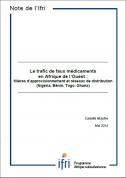Gateway to Think Tanks
| 来源类型 | Publications - Policy Papers |
| 规范类型 | 简报 |
| DOI | 978-2-36567-342-6 |
| Fake medicines trafficking in West Africa: Supply chains and distribution networks (Nigeria, Benin, Togo, Ghana) Notes de l'Ifri, December 2014 | |
| Camille NIAUFRE | |
| 发表日期 | 2014-12-19 |
| 出版年 | 2014 |
| 概述 | On December 13, 2013, in response to an Interpol initiative, the first ever African Conference on pharmaceutical crime was held in Addis Ababa, Ethiopia. Its final communiqué declared the intention of 20 countries to reinforce the struggle against the production of counterfeit drugs. |
| 摘要 |
Fake medicines trafficking in West Africa: Supply chains and distribution networks (Nigeria, Benin, Togo, Ghana) Notes de l'Ifri, December 2014
On December 13, 2013, in response to an Interpol initiative, the first ever African Conference on pharmaceutical crime was held in Addis Ababa, Ethiopia. Its final communiqué declared the intention of 20 countries to reinforce the struggle against the production of counterfeit drugs. 
Fake medicines trafficking in West Africa: Supply chains and distribution networks (Nigeria, Benin, Togo, Ghana)
Download
0.85 Mo
This mobilization of effort at the level of the whole continent is important: the scourge of counterfeit or fake drugs, which according to the World Health Organization represent no less than 10% of the medicines circulating in the world, affects Africa in particular. According to a recent study, bringing together results from 21 sub-Saharan countries, more than a third of the medicines collected and analyzed did not pass the chemical tests relating to quality or match what was written on the packaging. Anti-malarial drugs are the most affected. It is estimated that up to a million deaths a year world-wide are due directly or indirectly to people taking counterfeit medication. The fight against fake medicines appears to be essential for improving and protecting public health in African countries and so as to preserve progresses made in the fight against major pandemics. This task is made difficult by the international dimension of this illegal trading. Trafficking in counterfeit medicines is a world-wide business. The World Customs Organization (WCO) compiled a register of 106 producer countries and 146 destination countries. The production of fake ingredients, the creation of the “medicines” and their packaging, their exporting and transportation take place in a number of countries and involve a production and distribution chain of a kind that is as hidden as it is difficult to investigate. Our analysis concentrates on four countries which are “consumers” of counterfeit medicines in West Africa: Nigeria, Benin, Togo and Ghana. Their coastal situation means that they are in a “privileged” position to serve as entry and distribution points. The differences between what goes on in the four countries used for our study make a comparative approach particularly interesting, especially with regard to health care systems, medicine supply networks and the degree of resolve behind national efforts to combat counterfeiting. When studying these four West-African countries, the author has tried to trace back step by step through the stages of these industries and to understand how the production and distribution networks are organized. What techniques are used to avoid government controls and seizures at borders at one end, right down to local markets at the other? How do they manage in numerous cases to infiltrate official distribution networks so as to get their products on to the market – both official markets and unofficial ones? In its first three sections, this paper covers conditions pertaining to the production, export and transit routes for counterfeit medicines, how they enter Africa and how they are distributed via official and unofficial markets. The final section considers the question as to the type of criminality involved: is it correct to speak of mafia networks when it comes to the trafficking in counterfeit medicines in Africa? In conclusion, the paper provides a short account of efforts undertaken to fight against this scourge on both the national and the regional scale.
|
| 关键词 | Trafficking Benin Ghana Nigeria Sub-Saharan Africa Togo |
| URL | https://www.ifri.org/en/publications/enotes/notes-de-lifri/fake-medicines-trafficking-west-africa-supply-chains-and |
| 来源智库 | French Institute of International Relations (France) |
| 引用统计 | |
| 资源类型 | 智库出版物 |
| 条目标识符 | http://119.78.100.153/handle/2XGU8XDN/415922 |
| 推荐引用方式 GB/T 7714 | Camille NIAUFRE. Fake medicines trafficking in West Africa: Supply chains and distribution networks (Nigeria, Benin, Togo, Ghana) Notes de l'Ifri, December 2014. 2014. |
| 条目包含的文件 | ||||||
| 文件名称/大小 | 资源类型 | 版本类型 | 开放类型 | 使用许可 | ||
| niaufre.jpg(9KB) | 智库出版物 | 限制开放 | CC BY-NC-SA |  浏览 | ||
| 122014_niaufre_fake_(875KB) | 智库出版物 | 限制开放 | CC BY-NC-SA | 浏览 | ||
除非特别说明,本系统中所有内容都受版权保护,并保留所有权利。